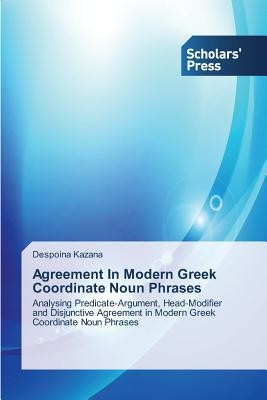
- We will send in 10–14 business days.
- Author: Despoina Kazana
- Publisher: Scholars' Press
- Year: 2014
- Pages: 280
- ISBN-10: 3639708946
- ISBN-13: 9783639708943
- Format: 15.2 x 22.9 x 1.6 cm, softcover
- Language: English
- SAVE -10% with code: EXTRA
Agreement In Modern Greek Coordinate Noun Phrases (e-book) (used book) | bookbook.eu
Reviews
Description
This book explores agreement in MG coordinate nouns within the constraint-based framework of Lexical-Functional Grammar. It investigates predicate-argument and head-modifier agreement with coordinate nouns and agreement with disjunctively conjoined nouns. In predicate-argument agreement, in addition to the syntactic and semantic agreement principles, we also find the referential principle, motivated by a Contextually Introduced Referent, the superordinate term of the coordinate nouns implied in the sentence. In head-modifier agreement, the shared MG definite determiner shows concord agreement and occurs only with the joint interpretation. It exceptionally occurs with a split reading when nouns are a natural coordination. A shared determiner shows index/concord agreement and occurs either with the joint or split interpretations. In disjunctively conjoined nouns, native speakers choose an agreeing verb based on the interpretation of disjunction as 'and-coordinate' and as 'exclusive-or'. Other factors, however, such as syntactic, may also determine number verb agreement.
EXTRA 10 % discount with code: EXTRA
The promotion ends in 17d.08:28:02
The discount code is valid when purchasing from 10 €. Discounts do not stack.
- Author: Despoina Kazana
- Publisher: Scholars' Press
- Year: 2014
- Pages: 280
- ISBN-10: 3639708946
- ISBN-13: 9783639708943
- Format: 15.2 x 22.9 x 1.6 cm, softcover
- Language: English English
This book explores agreement in MG coordinate nouns within the constraint-based framework of Lexical-Functional Grammar. It investigates predicate-argument and head-modifier agreement with coordinate nouns and agreement with disjunctively conjoined nouns. In predicate-argument agreement, in addition to the syntactic and semantic agreement principles, we also find the referential principle, motivated by a Contextually Introduced Referent, the superordinate term of the coordinate nouns implied in the sentence. In head-modifier agreement, the shared MG definite determiner shows concord agreement and occurs only with the joint interpretation. It exceptionally occurs with a split reading when nouns are a natural coordination. A shared determiner shows index/concord agreement and occurs either with the joint or split interpretations. In disjunctively conjoined nouns, native speakers choose an agreeing verb based on the interpretation of disjunction as 'and-coordinate' and as 'exclusive-or'. Other factors, however, such as syntactic, may also determine number verb agreement.


Reviews